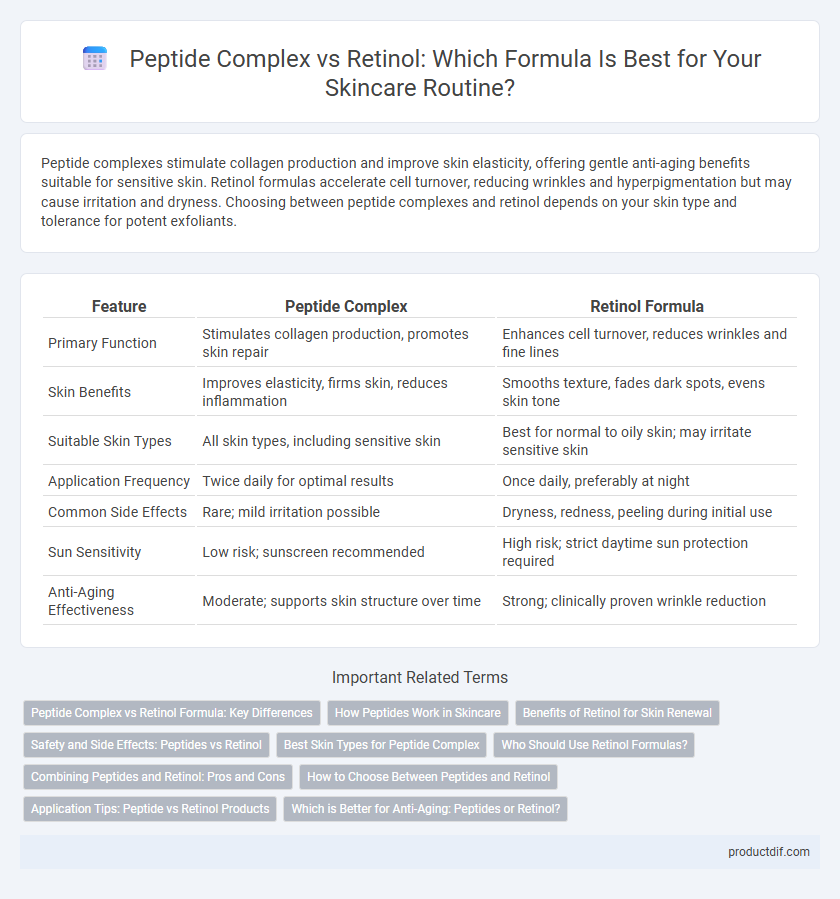Peptide complexes stimulate collagen production and improve skin elasticity, offering gentle anti-aging benefits suitable for sensitive skin. Retinol formulas accelerate cell turnover, reducing wrinkles and hyperpigmentation but may cause irritation and dryness. Choosing between peptide complexes and retinol depends on your skin type and tolerance for potent exfoliants.
Table of Comparison
| Feature | Peptide Complex | Retinol Formula |
|---|---|---|
| Primary Function | Stimulates collagen production, promotes skin repair | Enhances cell turnover, reduces wrinkles and fine lines |
| Skin Benefits | Improves elasticity, firms skin, reduces inflammation | Smooths texture, fades dark spots, evens skin tone |
| Suitable Skin Types | All skin types, including sensitive skin | Best for normal to oily skin; may irritate sensitive skin |
| Application Frequency | Twice daily for optimal results | Once daily, preferably at night |
| Common Side Effects | Rare; mild irritation possible | Dryness, redness, peeling during initial use |
| Sun Sensitivity | Low risk; sunscreen recommended | High risk; strict daytime sun protection required |
| Anti-Aging Effectiveness | Moderate; supports skin structure over time | Strong; clinically proven wrinkle reduction |
Peptide Complex vs Retinol Formula: Key Differences
Peptide Complex and Retinol Formula differ primarily in their mechanisms and skin benefits; Peptide Complex stimulates collagen production and supports skin barrier repair, while Retinol Formula accelerates cell turnover and reduces fine lines and pigmentation. Peptides are generally gentler and suitable for sensitive skin, whereas retinol offers potent anti-aging effects but may cause irritation initially. Choosing between them depends on skin type, concerns, and tolerance to active ingredients for optimal results.
How Peptides Work in Skincare
Peptides in skincare function by signaling skin cells to produce collagen, enhancing firmness and reducing wrinkles. Unlike retinol, which accelerates cell turnover and can cause irritation, peptides promote skin repair and hydration without sensitivity. Their ability to support the skin's natural barrier makes peptide complexes ideal for maintaining youthful, resilient skin.
Benefits of Retinol for Skin Renewal
Retinol stimulates collagen production, enhancing skin elasticity and reducing the appearance of fine lines and wrinkles. Its exfoliating properties accelerate cell turnover, promoting smoother, more even-toned skin. This powerful ingredient also helps fade hyperpigmentation and improves overall skin texture for a youthful, radiant complexion.
Safety and Side Effects: Peptides vs Retinol
Peptide complexes are generally considered safer for sensitive skin, as they work by signaling skin cells to enhance collagen production without causing irritation or photosensitivity. Retinol formulas, while effective for anti-aging, often come with side effects such as redness, peeling, and increased sun sensitivity, requiring careful usage and sun protection. Choosing peptides over retinol can minimize adverse reactions, making peptide-based products ideal for users with delicate skin or those seeking gentler maintenance.
Best Skin Types for Peptide Complex
Peptide Complex formulas are ideal for sensitive and mature skin due to their gentle nature and ability to stimulate collagen production without irritation. Unlike Retinol, which can cause dryness and redness, Peptide Complexes support skin barrier repair and hydration, making them suitable for dry and combination skin types. Their anti-aging benefits improve elasticity and firmness, promoting a smoother and more resilient complexion.
Who Should Use Retinol Formulas?
Retinol formulas are ideal for individuals seeking to reduce fine lines, wrinkles, and uneven skin tone due to their powerful collagen-boosting and cell turnover properties. Those with mature or sun-damaged skin benefit most from retinol's ability to stimulate skin renewal and improve texture. However, sensitive skin types should approach retinol use cautiously, starting with low concentrations to avoid irritation.
Combining Peptides and Retinol: Pros and Cons
Combining peptide complexes with retinol formulas offers a powerful synergy for anti-aging skincare by improving collagen production and reducing fine lines while enhancing skin texture. Peptides boost skin repair and hydration, complementing retinol's ability to accelerate cell turnover and fade hyperpigmentation, though their combined use can increase the risk of irritation and sensitivity if not properly formulated or introduced gradually. Optimizing this combination requires balancing concentrations and incorporating soothing ingredients to maximize efficacy and minimize adverse reactions.
How to Choose Between Peptides and Retinol
When choosing between peptide complexes and retinol formulas, consider your skin sensitivity and desired results; peptides are ideal for gentle, gradual skin repair and collagen stimulation, while retinol offers powerful anti-aging benefits by accelerating cell turnover and reducing wrinkles. Peptide complexes work well for improving skin elasticity and hydration without irritation, making them suitable for sensitive or dry skin types. Retinol formulas are more effective for targeting deep wrinkles and pigmentation but require careful sun protection and may cause initial redness or peeling.
Application Tips: Peptide vs Retinol Products
Peptide complex formulas are best applied on clean, dry skin, preferably in the morning, to stimulate collagen production and hydrate without irritation. Retinol products require nighttime application to avoid UV degradation, and starting with a low concentration helps minimize dryness and sensitivity. Layer peptides before heavier creams, while retinol should be paired with moisturizing serums to enhance tolerance and prevent peeling.
Which is Better for Anti-Aging: Peptides or Retinol?
Peptide complexes stimulate collagen production by signaling skin cells to repair damage, enhancing firmness and reducing fine lines over time. Retinol accelerates cell turnover and boosts collagen synthesis, effectively diminishing wrinkles and improving skin texture with consistent use. For sensitive skin, peptides offer a gentler anti-aging option, while retinol provides more dramatic results but may cause irritation during initial use.
Peptide Complex vs Retinol Formula Infographic

 productdif.com
productdif.com